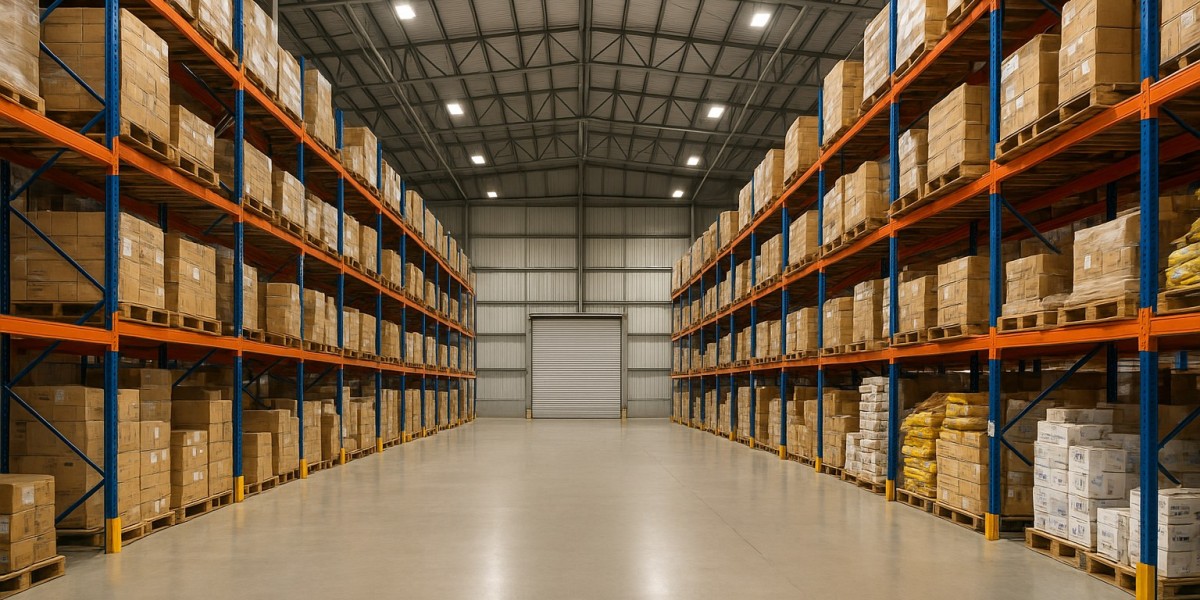Introduction
A food grade warehouse plays an important role in keeping food safe and fresh before it reaches customers. People often do not see how much work goes on behind the scenes in storage and delivery, yet these steps are critical for everyday life. A warehouse designed for food must follow strict rules to protect items from damage, contamination, or spoilage.
In this blog, readers will learn what a food grade warehouse is, how it works, and why it is linked closely with a wholesale warehouse and warehousing logistics. By the end, the importance of food safety in storage and transportation will be clear.
What is a Food Grade Warehouse
A food grade warehouse is a storage facility built with special care to handle food products. Unlike ordinary warehouses, these spaces follow rules set by food safety authorities. Walls, floors, and equipment must be easy to clean. Temperature control is another important feature because some food items require cold storage while others need dry conditions.
Standards in Food Storage
Authorities such as the U.S. Food and Drug Administration (FDA) provide strict guidelines for food storage. These include:
Clean and sealed surfaces to prevent pests.
Proper ventilation to keep air fresh.
Separation of raw and processed food items.
Moreover, workers in a food grade warehouse must follow hygiene practices. Gloves, hair nets, and clean uniforms reduce the risk of contamination.
Safety and Trust
When a company uses a food grade warehouse, it builds trust with both suppliers and customers. Safe storage reduces food waste, saves money, and ensures people receive high-quality products.
The Link Between Food Grade and Wholesale Warehouse
A wholesale warehouse works closely with food grade storage. Wholesale warehouses sell products in large quantities to retailers, restaurants, and other businesses. Many of these products include food items, making food grade standards vital.
Large Scale Distribution
Wholesale warehouses are usually larger than ordinary storage spaces. They handle a wide variety of products, from packaged snacks to frozen goods. To move these items safely, many wholesale warehouses also meet food grade standards.
Efficiency in Operations
By combining the safety rules of food grade storage with the size and scale of wholesale operations, businesses can achieve smooth operations. Customers buying in bulk want to be confident that products will arrive in good condition. This balance helps suppliers maintain long-term business relationships.
The Role of Warehousing Logistics in Food Safety
Warehousing logistics is the system that manages how goods are stored, moved, and delivered. In the case of food, logistics becomes even more important because timing and conditions directly affect freshness.
Transportation and Timing
For example, milk or frozen vegetables cannot sit in a truck for too long. Proper warehousing logistics ensures that shipments leave on time, reach their destinations quickly, and stay at the right temperature.
Technology in Logistics
Modern warehouses use technology such as barcode systems, sensors, and tracking software. These tools help managers monitor stock levels and check whether food is kept under the right conditions. Moreover, digital systems make it easier to reduce mistakes and avoid delays.
Reducing Waste
Good logistics not only protects food quality but also helps reduce waste. When food is stored correctly and moved efficiently, fewer products expire before reaching customers. This benefits both businesses and the environment.
Benefits of a Food Grade Warehouse for Businesses
Businesses that rely on food grade storage gain many advantages.
Customer Confidence
When products are stored safely, businesses build trust. Customers feel confident buying from companies that follow strict food safety rules.
Compliance with Laws
Food grade warehouses help businesses comply with national and international food safety laws. Non-compliance can lead to fines, loss of reputation, or even closure.
Smooth Supply Chain
With proper warehousing logistics, the supply chain becomes reliable. Retailers can keep shelves stocked, and restaurants can serve meals without interruption.
Cost Savings
While building or renting a food grade warehouse may seem expensive, the long-term benefits are greater. Less waste and fewer recalls mean more savings for businesses.
Challenges in Food Grade Warehousing
Despite the many benefits, food grade warehouses also face challenges.
Strict Monitoring
Managers must constantly monitor conditions such as temperature, humidity, and cleanliness. Even a small mistake can lead to spoiled goods.
High Costs
Installing cooling systems, sanitation equipment, and monitoring technology requires investment. However, these costs are necessary to meet safety standards.
Staff Training
Employees must understand food safety rules clearly. Training takes time and effort but is crucial to maintain standards.
The Future of Food Grade Warehouses
The future of food storage is moving toward more technology and sustainability.
Automation
Robots and automated systems are becoming common in warehouses. They reduce human error, speed up operations, and keep food safe.
Sustainable Practices
More businesses are adopting eco-friendly methods, such as solar energy, recyclable packaging, and waste reduction. Food grade warehouses that focus on sustainability will play a larger role in global supply chains.
Growing Demand
As populations grow and demand for ready-to-eat food increases, food grade warehouses will become even more important. Safe storage will continue to support wholesale operations and modern warehousing logistics.
Conclusion
A food grade warehouse is not just a place to store food. It is a system that protects health, builds trust, and supports global trade. By working closely with wholesale warehouses and using strong warehousing logistics, businesses can deliver safe and fresh products to customers worldwide.
Although challenges exist, the benefits of food grade storage far outweigh the difficulties. With the rise of automation, sustainability, and stricter food safety laws, these warehouses will remain at the heart of supply chains. Businesses that invest in proper food grade storage ensure long-term success and customer trust.








